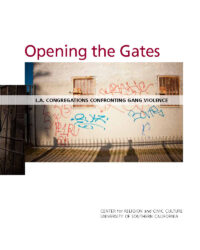Over the past four decades, the cultural kaleidoscope that is L.A.’s East Side has shifted around Randy Carillo. Meanwhile, he says, his faith has remained steadily rooted in the ecumenical evangelicalism of his father.
A fourth-generation Mexican American, Carillo’s family lived in Boyle Heights until he was 13, then moved to Eagle Rock, which in the mid-1960s was mainly Anglo and Italian.
“It was like moving to a foreign country,” Carillo says. “I went from a place where cars were being worked on in the front yard to shady streets with birds singing in the trees.”
At Eagle Rock high school, which is now almost 70 percent Latino, Carillo says he could count his other Latino classmates on one hand.
After stints at Azusa Pacific University and UCLA, Carillo deferred his formal education for a few years in order to join a Christian rock group and participate in the Jesus Movement that was flourishing in California in the early 1970s.
When he finally completed his studies in divinity and returned to the East Side to work as an ecumenical organizer, he found that a dramatically diverse—and dauntingly fragmented—collection of faith communities had supplanted the more homogenous congregations he had known in his youth.
The clergy in the Highland Park Ministerial Fellowship, which Carillo began to lead in 2001, mainly saw the organization as a professional support group until Carillo’s gentle nudging toward community activism began to pay off a few years later.
“Now all the people who were complaining about the idea of dealing with city agencies are bragging about working with the community,” Carillo says wryly.
The penny dropped after Carillo’s training in the Institute for Violence Prevention—particularly the instruction in public policy engagement.
“That was transforming,” Carillo says.
A prisoner reentry program was running aground because of pastors’ resistance to the idea of inviting mental health workers to offer services to former convicts and their families. Carillo says that because of his IVP experience, he was able to assess the group’s core concerns and negotiate with city and county officials to establish ground rules for the mental health component of the reentry program. Specifically, the pastors wanted “a face” (i.e. a single contact person) to be their liaison with civic agencies involved in the program, clergy involvement in decision-making processes and a focus on healing rather than medication in developing treatment plans.
“The mental health people were really great,” Carillo says. “They told me, ‘Pastor Randy, we got your face—her name is Laura.’”
Carillo’s ecumenical group has now evolved into the Church of the City Coalition, and he’s now tackling programs that engage the members of his community in work with L.A. County’s Department of Children and Family Services and the Veteran’s Administration.
“It all goes back to the belief that we’re living in the Kingdom of God right now,” Carillo says. “’Become the people I called you to be.’ That’s what it’s all about.”
Nick Street was a senior writer with the USC Center for Religion and Civic Culture.

